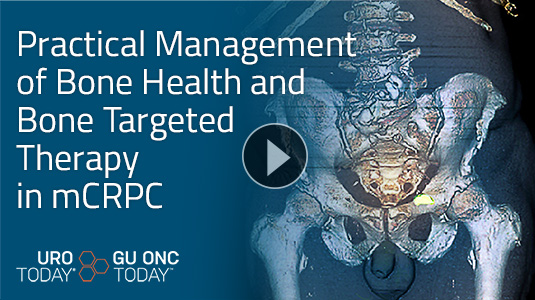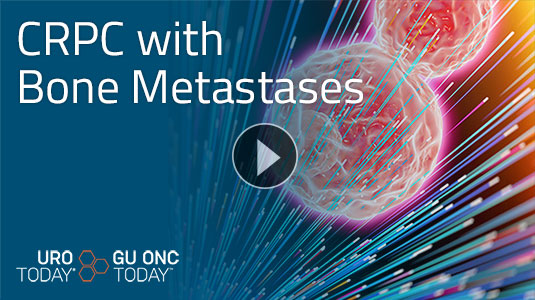Transformative Evidence
Enzalutamide vs. a Combination of Ra223 and Enzalutamide in Asymptomatic or Mildly Symptomatic Castration-Resistant Prostate Cancer Patients Metastatic to Bone (EORTC-1333-GUCG/PEACE III)
Curated by Clinicians: Educational Forum with Videos, Abstracts and Conference Information
Videos
Physician-Scientist Review Articles
State of the Evidence Review Articles
First-Line Combination Treatment with PARP and Androgen Receptor-Signaling Inhibitors in HRR-Deficient mCRPC: Applying Clinical Study Findings to Clinical Practice in the United States - Beyond the Abstract
November 5, 2024
While most patients with prostate cancer are diagnosed with localized disease, a subset will develop metastatic disease, and subsequently castration-resistant prostate cancer (mCRPC), which remains incurable. Additionally, an increasing number of patients will present with de novo metastatic prostate cancer, known as metastatic castration-sensitive prostate cancer (mCSPC), and may progress to mCRPC. In the mCSPC setting, treatment intensification of androgen deprivation therapy (ADT) with androgen receptor (AR) pathway inhibitors (ARPIs; alternatively called androgen receptor signaling inhibitors or ARSIs), with or without docetaxel, has improved overall survival versus ADT alone. However, real-world evidence indicates that many men with mCSPC do not receive such treatment intensification. Read More
Conference Coverage
Conference Highlights Written by Physician-Scientist
ESMO 2024: Radium-223 and Enzalutamide in Asymptomatic or Mildly Symptomatic Patients with Bone Metastatic Castration-Resistant Prostate Cancer: First Results of EORTC-GUCG 1333/PEACE-3
Presented by Silke Gillessen Sommer, MD
(UroToday.com) The 2024 European Society for Medical Oncology (ESMO) Annual Congress held in Barcelona, Spain between September 13th and 16th, 2024 was host to a presidential symposium of practice-changing trials. Professor Silke Gillessen presented the initial results of EORTC-GUCG 1333/PEACE-3 Read More
ESMO 2024: Bayer to Present New Prostate Cancer Data and Continued Oncology Portfolio Research at ESMO 2024
Bayer will present new oncology data, including a late-breaking, comprehensive analysis from the Phase III ARANOTE trial investigating NUBEQA® (darolutamide) plus androgen deprivation therapy (ADT) in patients with metastatic hormone-sensitive prostate cancer (mHSPC), at the European Society for Medical Oncology (ESMO) Congress, taking place in Barcelona, Spain, from September 13-17, 2024.
Read More
PSMA PET and RLT 2024: The Role of Radium-223 in the Setting of PSMA PET
Presented by Oliver Sartor, MD
The 2024 PSMA conference featured a presentation by Dr. Oliver Sartor discussing the role of radium-223 in the setting of PSMA PET. Dr. Sartor started by highlighting that based on the ALSYMPCA trial published in 2013,1 this was the first alpha emitter approved in all of medicine. Read More
ASCO 2021: Decreased Fracture Rate by Mandating Bone Protecting Agents in the EORTC 1333/PEACEIII Trial Combining Radium-223 with Enzalutamide Versus Enzalutamide Alone: An Updated Safety Analysis
Presented by Silke Gillessen, MD
Bone strengthening agents such as bisphosphonates or the RANKL-targeting antibody denosumab reduced the bone loss associated with androgen deprivation therapy (ADT) and prevent skeletal-related events in castration resistant prostate cancer (CRPC). The use of these agents is recommended in CRPC by many guidelines. Read More
ASCO 2021: Decreased Fracture Rate by Mandating Bone Protecting Agents in the EORTC 1333/PEACEIII Trial Combining Ra223 with Enzalutamide Versus Enzalutamide Alone: An Updated Safety Analysis
Presented by Silke Gillessen, MD
Beginning with the introduction of docetaxel for metastatic castration resistant prostate cancer (mCRPC) in 2004, there has been a dramatic and rapid proliferation of systemic therapy options in advanced prostate cancer including a number of novel hormonal therapies (including abiraterone acetate and enzalutamide), Read More
ASCO 2019: Decreased Fracture Rate by Mandating Bone-protecting Agents in the EORTC 1333/PEACE III Trial
Presented by Bertrand F. Tombal, MD, PhD
Skeletal fractures, pathological or not, are a frequent and underestimated side-effect of systemic treatment of metastatic castration-resistant prostate cancer (mCRPC). The ERA223 trial randomized 806 patients with chemotherapy-naïve, mCRPC with bone metastasis to radium-223 or placebo, in addition to abiraterone acetate. Read More
ASCO GU 2018: Enzalutamide vs. a combination of Ra223 and enzalutamide in asymptomatic or mildly symptomatic CRPC patients metastatic to bone (PEACE III)
Presented by Bertrand Tombal, MD, PhD
Dr. Bertrand Tombal and colleagues presented the trial design for PEACE III, enzalutamide vs. a combination of radium-223 (Ra-223) and enzalutamide in asymptomatic or mildly symptomatic CRPC patients metastatic to bone. The α-emitting radiopharmaceutical Ra-223 reduced the risk of death by 30% vs placebo in the phase III ALSYMPCA trial.1 Read More






